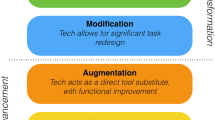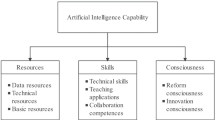Abstract
The purpose of this research was to investigate the extent of the relationship between select technology and science preparation experiences of United States (US) technology and engineering (T&E) teachers and their teaching of science content and practices. Utilizing a fully integrated mixed methods design (Teddlie and Tashakkori in Res Schools 13(1):12–28, 2006), this study was conducted to inform the pre- and in-service preparation needs for US T&E educators. A random sample of 55 Foundations of Technology (FoT) teachers across 12 US county school systems within an International Technology and Engineering Educators Association consortium state participated in an online survey, leading to eight teachers being purposefully selected for classroom observations. Data collected from the surveys and classroom observations were analyzed through Spearman’s rho tests to examine the strength of the relationships between certain formal/informal preparation factors and the teaching of science content and practices. These data were corroborated with FoT curriculum content analyses, classroom observation audio recordings and notes, and interview responses to help validate the results. Analyses of the data revealed significant correlations between specific formal and informal preparation experiences and the observed teaching of science content and practices. The findings and conclusions drawn from the data analyses provided implications for T&E educators, science educators, educational researchers, pre-service programs, and in-service professional development efforts.

Similar content being viewed by others
References
Abell, S. K. (2008). Twenty years later: Does pedagogical content knowledge remain a useful idea? International Journal of Science Education, 30(10), 1405–1416.
Ball, D. L., & Hill, H. C. (2008). Learning mathematics for teaching: Survey of elementary teachers. Report prepared for Learning Mathematics for Teaching Project, University of Michigan, Ann Arbor, MI.
Bloor, M., & Wood, F. (2006). Keywords in qualitative methods: A vocabulary of research concepts. Thousand Oaks, CA: Sage.
Collins, K. M. T., Onwuegbuzie, A. J., & Jiao, Q. G. (2007). A mixed methods investigation of mixed methods sampling designs in social and health science research. Journal of Mixed Methods Research, 1(3), 267–294. doi:10.1177/1558689807299526.
Creswell, J. W. (2002). Educational research: Planning, conducting, and evaluating quantitative and qualitative research. Upper Saddle River, NJ: Pearson Education.
Cwik, L. C. (2012). The relation between middle school science teachers’ science content preparation, professional development, and pedagogical content knowledge and their attitudes and beliefs towards inquiry-based instruction. (Doctoral dissertation). Retrieved from ProQuest, UMI Dissertations database (3520547).
de Vries, M. J. (2003, May). Book reviews. [Review of the book Examining pedagogical content knowledge, by J. Gess-Newsome & N. G. Lederman (Eds.)] International Journal of Technology and Design Education, 13(2), 196–198. doi:10.1023/A:1024189525122
Fan, S. C., & Ritz, J. M. (2014). International views on STEM education. In M. de Vries (Ed.), Research into technological and engineering literacy core connections. Proceedings of the 28th pupil’s attitude toward technology conference, Orlando, FL: ITEEA (pp. 7–14). Retrieved from http://www.iteea.org/Conference/PATT/PATT28/Fan%20Ritz.pdf
Fox-Turnbull, W. (2006). The influences of teacher knowledge and authentic formative assessment on student learning in technology education. International Journal of Technology and Design Education, 16(1), 53–77. doi:10.1007/s10798-005-2109-1.
Gess-Newsome, J., & Lederman, N. G. (2002). Pedagogical content knowledge: An introduction and orientation. Contemporary Trends and Issues in Science Education, 6(1), 3–17. doi:10.1007/0-306-47217-1_1.
Gumbo, M. T., & Williams, P. J. (2014). Discovering grade 8 technology teachers’ pedagogical content knowledge in the Tshwane district of Gauteng province. International Journal of Educational Sciences, 6(3), 479–488.
Hill, H. C., Ball, D. L., & Schilling, S. G. (2008). Unpacking pedagogical content knowledge: Conceptualizing and measuring teachers’ topic specific knowledge of students. Journal for Research in Mathematics Education, 39(4), 372–400.
Howell, D. C. (2007). Statistical methods for psychology (6th ed.). Belmont, CA: Thomson Wadsworth.
Hume, A., & Berry, A. (2011). Constructing CoRes—a strategy for building PCK in pre-service science teacher education. Research in Science Education, 41(3), 341–355. doi:10.1007/s11165-010-9168-3.
Hynes, M. M. (2012). Middle-school teachers’ understanding and teaching of the engineering design process: A look at subject matter and pedagogical content knowledge. International Journal of Technology and Design Education, 22(3), 345–360. doi:10.1007/s10798-010-9142-4.
Hynes, M. M., Crismond, D., & Brizuela, B. (2010). Middle-school teachers’ use and development of engineering subject matter knowledge: Analysis of three cases. In Proceedings of the American society for engineering education. AC 2010-447.
International Technology Education Association (ITEA/ITEEA). (2000/2002/2007). Standards for technological literacy: Content for the study of technology. Reston, VA: Author.
International Technology and Engineering Educators Association (ITEEA). (2015). ITEEA in a box. Retrieved from https://www.iteea.org/Activities/39081/ITEEAinaBOX.aspx
International Technology and Engineering Educators Association (ITEEA). (2016). STEM education product guide: 2016–2017. Reston, VA: Author. Retrieved from https://www.iteea.org/File.aspx?id=52775&v=dfdfe81e
Israeli Ministry of Education. (2015). About. Jerusalem, Israel: Science and Technology Administration. Retrieved from http://cms.education.gov.il/EducationCMS/Units/MadaTech/englishsifria/ScienceandTechnologyAdministration/Odot_Aminhal_eng.htm
Jones, A., & Moreland, J. (2004). Enhancing practicing primary school teachers’ pedagogical content knowledge in technology. International Journal of Technology and Design Education, 14(2), 121–140. doi:10.1605/01.301-0011005022.2010.
Krauss, S., Baumert, J., & Blum, W. (2008). Secondary mathematics teachers’ pedagogical content knowledge and content knowledge: Validation of the COACTIV constructs. The International Journal on Mathematics Education, 40(5), 873–892.
Litowitz, L. S. (2014). A curricular analysis of undergraduate technology & engineering teacher preparation programs in the United States. Journal of Technology Education, 25(2), 73–84.
Lomas, G & Nicholas, P. (2009). The impact of a university course focusing on PCK and MCK: Does teachers’ classroom practice reflect the professional development experience? Findings from the New Zealand numeracy development projects, 189–197. Report prepared for the New Zealand Ministry of Education, Wellington.
Loughran, J., Berry, A., & Mulhall, P. (2012). Understanding and developing science teachers’ pedagogical content knowledge. New York: Sense Publishers.
Love, T. S. (2015a). Examining the extent to which select teacher preparation experiences inform technology and engineering educators’ teaching of science content and practices (Doctoral dissertation). Virginia Tech, Blacksburg, VA. Retrieved from http://vtechworks.lib.vt.edu/handle/10919/64004
Love, T. S. (2015b). Examining the demographics and preparation experiences of foundations of technology teachers. Journal of Technology Studies, 41(1), 58–71.
Love, T. S., Wells, J. G., & Parkes, K. A. (under review). Examining the teaching of science, and technology and engineering content and practices: An instrument modification study. Journal of Technology Education.
Magnusson, S., Krajcik, J., & Borko, H. (1999). Nature, sources, and development of pedagogical content knowledge for science teaching. In J. Gess-Newsome & N. G. Lederman (Eds.), Examining pedagogical content knowledge: The construct and its implications for science education (pp. 95–132). Dordrecht: Kluwer Academic Publishers.
Manizade, A. G., & Mason, M. M. (2011). Using delphi methodology to design assessments of teachers’ pedagogical content knowledge. Educational Studies in Mathematics, 76(2), 183–207. doi:10.1007/s10649-010-9276-z.
Martin, G., & Ritz, J. (2014). Comparative analysis of research priorities for technology education. Australasian Journal of Technology Education, 1(2014), 9–17. Retrieved from http://www.ajte.org/index.php/AJTE/article/download/12/2
McAlister, B. K. (2004, November). Are technology education teachers prepared to teach engineering design and analytical methods? Paper presented at the 91st Mississippi Valley Technology Teacher Education Conference, Chicago, IL.
McRobbie, C. J., Stein, S. J., & Ginns, I. (2001). Exploring designerly thinking of students as novice designers. Research in Science Education, 31(1), 91–116. doi:10.1023/A:1012693626534.
Nadelson, L. S., & Farmer, C. (2012, July 31). Developing standards for teaching engineering. NSTA WebNews Digest. Retrieved from http://www.nsta.org/publications/news/story.aspx?id=59528
NGSS Lead States. (2013). Next generation science standards: For states, by states. Washington, DC: National Academies Press.
Nulty, D. D. (2008). The adequacy of response rates to online and paper surveys: What can be done? Assessment & Evaluation in Higher Education, 33(3), 301–314. doi:10.1080/02602930701293231.
Onwuegbuzie, A. J., & Leech, N. L. (2005). The role of sampling in qualitative research. Academic Exchange Quarterly, 9, 280–284.
Park, S., Jang, J., Chen, Y., & Jung, J. (2011). Is pedagogical content knowledge (PCK) necessary for reformed science teaching? Evidence from an empirical study. Research in Science Education, 41(2), 245–260. doi:10.1007/s11165-009-9163-8.
Perez, B. (2013). Teacher quality and teaching quality of 7th-grade algebra I honors teachers. (Doctoral dissertation). Retrieved from ProQuest, UMI Dissertations database (3571434).
Phillips, K. R., De Miranda, M. A., & Shin, J. T. (2009). Pedagogical content knowledge and industrial design education. The Journal of Technology Studies, 35(2), 47–55.
Riggs, I. M., & Enochs, L. G. (1990). Toward the development of an elementary teacher’s science teaching efficacy belief instrument. Science Education, 74(6), 625–637. doi:10.1002/sce.3730740605.
Rohaan, E. J. (2009). Testing teacher knowledge for technology teaching in primary schools. (Doctoral dissertation). Retrieved from WorldCat Dissertations and Theses Database (723295777).
Rohaan, E. J., Taconis, R., & Jochems, W. G. (2011). Exploring the underlying components of primary school teachers’ pedagogical content knowledge for technology education. Eurasia Journal of Mathematics, Science & Technology Education, 7(4), 293–304.
Sawada, D., Piburn, M., Falconer, K., Turley, J., Benford, R., & Bloom, I. (2000). Reformed teaching observation protocol (RTOP) (ACEPT technical report No. IN00-1). Tempe, AZ: Arizona Collaborative for Excellence in the Preparation of Teachers, Arizona State University.
Sheskin, D. J. (2011). Handbook of parametric and nonparametric statistical procedures (5th ed.). New York, NY: Chapman and Hall.
Shulman, L. S. (1987). Knowledge and teaching: Foundations of the new reform. Harvard Educational Review, 57(1), 1–22.
Shulman, L. S., & Hutchings, P. (2004). Teaching as community property: Essays on higher education. San Francisco: Jossey-Bass.
Strimel, G. (2013). Engineering by design™: Preparing STEM teachers for the 21st century. In J. Williams & D. Gedera (Eds.), Technology education for the future—A play on sustainability. Proceedings of the 27th pupil’s attitude toward technology conference (pp. 447–456). Christchurch: University of Waikato.
Taylor, J. A., Getty, S. R., Kowalski, S. M., Wilson, C. D., Carlson, J., & Scotter, P. V. (2013). An efficacy trial of research-based curriculum materials with curriculum-based professional development. Biological Sciences Curriculum Study. Retrieved from http://bscs.org/sites/default/files/_media/research/downloads/BSCS_EfficacyTrialofInquiryApproach.pdf
Teddlie, C., & Tashakkori, A. (2006). A general typology of research designs featuring mixed Methods. Research in the Schools, 13(1), 12–28.
Vaismoradi, M., Turunen, H., & Bondas, T. (2013). Content analysis and thematic analysis: Implications for conducting a qualitative descriptive study. Nursing & Health Sciences, 15(3), 398–405. doi:10.1111/nhs.12048.
Wells, J. G. (2008, November). STEM education: the potential of technology education. Paper presented at the 95th Mississippi Valley Technology Teacher Education Conference, St. Louis, MO, 1–21.
Wells, J. G. (2016). PIRPOSAL model of integrative STEM education: Conceptual and pedagogical framework for classroom implementation. Technology and Engineering Teacher, 75(6), 12–19.
Wells, J. G., & Ernst, J. V. (2012/2015). Integrative STEM education. Blacksburg, VA: Virginia Tech: Invent the Future, School of Education. Retrieved from http://www.soe.vt.edu/istemed/
Williams, J., & Lockley, J. (2012). Using CoRes to develop the pedagogical content knowledge (PCK) of early career science and technology teachers. Journal of Technology Education, 24(1), 34–53.
Author information
Authors and Affiliations
Corresponding author
Rights and permissions
About this article
Cite this article
Love, T.S., Wells, J.G. Examining correlations between preparation experiences of US technology and engineering educators and their teaching of science content and practices. Int J Technol Des Educ 28, 395–416 (2018). https://doi.org/10.1007/s10798-017-9395-2
Accepted:
Published:
Issue Date:
DOI: https://doi.org/10.1007/s10798-017-9395-2




